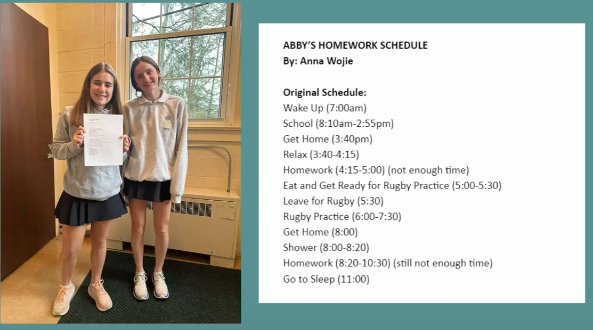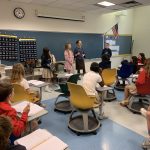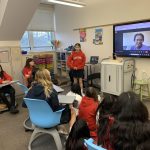Oak Knoll Students Certified as Social Innovators by the University of Pennsylvania
 Adrienne Lee ’27, Anna Wojie ’25, Anne Tobin ’26, Claire Kleedorfer ’25, Oceana Li ’27, Sofia Duhart ’25, and Vittoria Gentile ’27 completed a 12-week Oak Knoll signature program entitled Social Innovators. The University of Pennsylvania and Schoolyard Ventures administer the program, and it takes place during the student’s own time and under their own initiatives. Each student researched, prototyped, tested, refined, or launched a venture of their own creation that sought to create value and positively impact society. They will receive certificates in Social Innovation from the University of Pennsylvania.
Adrienne Lee ’27, Anna Wojie ’25, Anne Tobin ’26, Claire Kleedorfer ’25, Oceana Li ’27, Sofia Duhart ’25, and Vittoria Gentile ’27 completed a 12-week Oak Knoll signature program entitled Social Innovators. The University of Pennsylvania and Schoolyard Ventures administer the program, and it takes place during the student’s own time and under their own initiatives. Each student researched, prototyped, tested, refined, or launched a venture of their own creation that sought to create value and positively impact society. They will receive certificates in Social Innovation from the University of Pennsylvania.
Lee’s “Major Mentor” project sought to connect high school students with college students or adults in certain professions to help them select a college major. Asked what advice she would give herself after completing the program, she said, “I’d tell myself to stop being afraid and just dive into the entrepreneurial process. Being too scared initially slowed me down, and I was much more productive when I did not let my worries get in the way.”
Wojie sought a productivity solution for busy student-athletes to help them utilize their time better and improve their grades. She found that creating custom and detailed time schedules for individual students helped them improve their grades and reduced stress. “I’m so glad I got to make new connections with other student-athletes,” she explained. “I love helping others and creating solutions, so the fact that I could help my friends and create new friendships was a great experience for me.”
Tobin sought a project to prevent procrastination, help teens understand their procrastination style, and share tools to help. Her Preventing Procrastination solution is formatted as a test and asks students questions about their learning style and how they operate in the school environment. Interestingly, she used herself as a research subject and gained insight. “I learned I am a more visual learner,” she explained. “The root of my procrastination was my addiction to my phone, which is a visual attraction. I eventually started using my phone less overall rather than just while doing school work.”
Kleedorfer came to her project after learning that several stress fractures she experienced were the result of poor nutrition. Her project, Consistent Nutrition, is focused on increasing access to education about nutrition through the creation of a nutrition club and by providing basic nutrition guides on a website. Forming the club was a step out of her comfort zone. She said, “This program taught me that to grow, you need to have uncomfortable situations and can’t hold yourself back from your potential because of a few nerves.”
Li’s project sought to help the average stroke survivor reconnect with their past life and places of comfort. Her solution is connecting stroke victims to a website called Back Home that allows people to use imagery and sounds to recreate experiences like walking a family dog or strolling on the beach. In researching her solution, she joined a Facebook group for stroke victims and found herself reaching out to strangers. “I learned not to be afraid of anything in the process,” she said. “For example, reaching out to strangers was something I wasn’t extremely comfortable with because I wasn’t sure what their response would be. But at the end of the day, there’s nothing to lose and people like helping.”
Duhart addressed the lack of adequate sleep many student-athletes get, and after interviewing many students, she determined screen time was a primary culprit. On average, students were getting 6-8 hours sleep rather than the 8-10 hours recommended. “Athletes bodies are more exhausted, more overused, meaning that they seriously need to get the sleep of eight to ten hours to perform at their best,” she related. She experimented with solutions such as calling on a parent to set password-protected screen shut-offs but is still working on various options. “At first, I wasn’t aware of what this program fully entailed, but as I started to find different topics and adjust my project, I began to see the beauty of entrepreneurship,” she added.
Gentile was concerned that students with part-time jobs face many struggles. Her solution, Study Buddy, is a proposed study and time management app meant to connect students with a partner and help them be as productive as possible. She summed up the program nicely when asked what it was like going through the Social Innovators program with her peers.
“My participation in the program taught me many things I had never known were part of the entrepreneurship process,” she concluded. “I learned to leave my comfort zone and consult people I’m not close with on what to do to continue my project. Going through this process with other teens was an exciting experience. It was great to see how different people can take the same prompt, look for problems in the community, and have such different solutions based on their unique personal experiences. It shows that there’s no limit to creativity when a group of people come together and brainstorm their ideas.”






